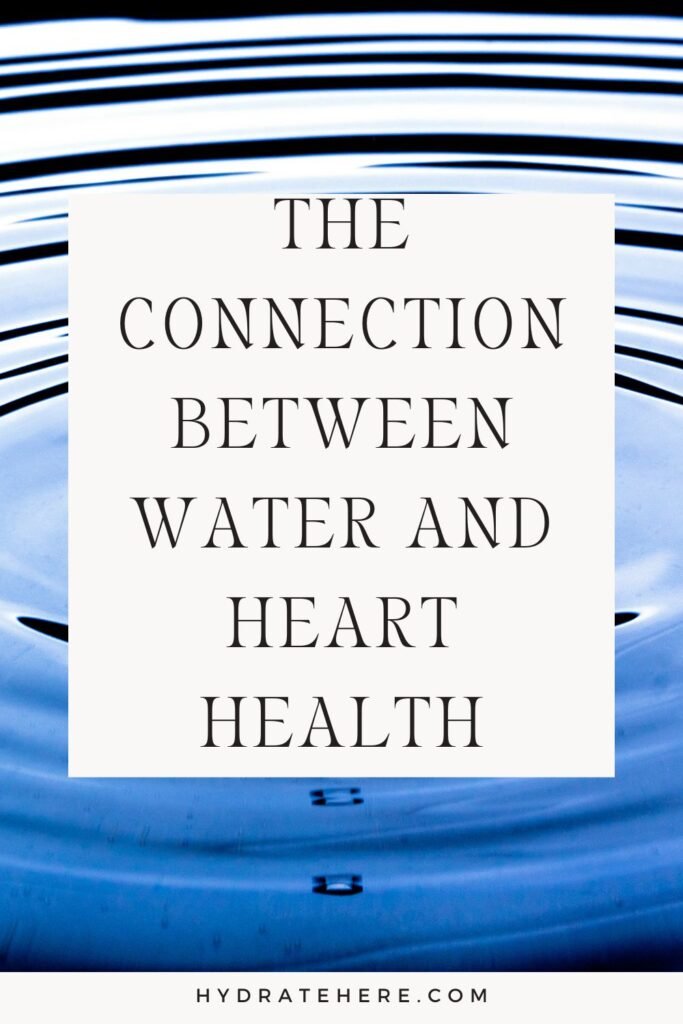The Connection Between Water and Heart Health
There are some affiliate links below, but they are all products I highly recommend. For more info, view my disclosure here.
When it comes to heart health, we often focus on diet and exercise. But did you know proper hydration plays a huge role in keeping your heart happy? It’s true! Water works wonders for our tickers.
In this article, we’ll dive into the vital connection between water and heart health. We’ll unpack how dehydration can actually create issues like high blood pressure and irregular heartbeat.
But don’t worry – I’ll also share actionable tips for making sure you stay hydrated and your heart thrives. You’ll learn fun ways to get more water in your day effortlessly.
The Importance of Hydration for Heart Health
Staying hydrated is crucial for maintaining a healthy heart. Your heart is constantly working hard to pump blood and deliver oxygen and nutrients to your body. Without enough water, your heart has to work even harder, putting unnecessary strain on it. Dehydration can lead to an increased heart rate and decreased blood volume, which can potentially lead to heart problems. By staying hydrated, you can help ensure that your heart is functioning optimally.
When you drink enough water, it helps to maintain proper blood viscosity, making it easier for your heart to pump blood throughout your body. This can help lower your blood pressure and reduce the risk of cardiovascular diseases such as heart attacks and strokes. Additionally, adequate hydration helps to prevent the formation of blood clots, which can block blood flow to the heart and cause serious complications.
Furthermore, staying hydrated promotes overall cardiovascular health by improving your circulation. When you’re properly hydrated, your blood vessels are more dilated, allowing for smoother blood flow. This means that your heart doesn’t have to work as hard to pump blood, reducing the strain on your cardiovascular system.
How Dehydration Affects Your Cardiovascular System
You mightn’t realize it, but not drinking enough water can directly impact how your cardiovascular system functions. Dehydration can lead to a decrease in blood volume, making it harder for your heart to pump blood efficiently. When you don’t drink enough water, your blood becomes thicker, causing your heart to work harder to circulate it throughout your body. This increased strain on your heart can lead to elevated blood pressure and an increased risk of heart disease.
In addition to affecting your blood volume, dehydration can also impact your blood pressure. When you’re dehydrated, your body releases hormones that constrict your blood vessels in an attempt to conserve water. This constriction increases your blood pressure, putting additional stress on your heart. Over time, this can lead to damage to your blood vessels and increase your risk of developing cardiovascular diseases such as hypertension and stroke.
Furthermore, dehydration can also affect your heart rate. When you’re dehydrated, your body tries to compensate by increasing your heart rate to maintain blood flow. This increased heart rate can put a strain on your heart and potentially lead to irregular heart rhythms.
To keep your cardiovascular system functioning optimally, it’s crucial to stay hydrated. Make sure to drink enough water throughout the day and listen to your body’s thirst signals. By staying properly hydrated, you can support your heart health and reduce the risk of cardiovascular diseases.
Water and Blood Pressure: The Link to Heart Health
Drinking enough water is essential for maintaining a healthy blood pressure and supporting your cardiovascular system. When you stay hydrated, it helps to regulate your blood volume, which in turn affects your blood pressure. When you don’t drink enough water, your blood volume decreases, causing your blood vessels to narrow and your blood pressure to rise. This increased pressure puts extra strain on your heart, making it work harder to pump blood throughout your body. Over time, this can lead to the development of high blood pressure, also known as hypertension, which is a major risk factor for heart disease.
By drinking an adequate amount of water each day, you can help to keep your blood pressure within a healthy range and reduce your risk of heart disease. The American Heart Association recommends consuming at least eight cups of water per day, but individual needs may vary depending on factors such as age, activity level, and climate. It’s important to listen to your body and drink when you’re thirsty, as thirst is a sign that your body needs more fluids.
In addition to maintaining a healthy blood pressure, drinking enough water also supports your cardiovascular system in other ways. Water helps to deliver oxygen and nutrients to your cells, flushes out waste products, and keeps your blood flowing smoothly. It also helps to prevent the formation of blood clots, which can lead to heart attacks and strokes. So, make sure you’re staying hydrated throughout the day to keep your heart and cardiovascular system in tip-top shape.
The Role of Water in Preventing Heart Disease
To maintain a healthy cardiovascular system and reduce the risk of heart disease, it’s crucial to ensure adequate water intake. Water plays a vital role in preventing heart disease and keeping your heart healthy. When you don’t drink enough water, your blood becomes thicker, increasing the workload on your heart. Dehydration can also lead to higher blood pressure, which is a significant risk factor for heart disease. By staying properly hydrated, you can help lower your blood pressure and maintain a healthy heart.
Water also helps to prevent the buildup of plaque in your arteries, a condition known as atherosclerosis. When plaque accumulates in your arteries, it restricts blood flow to your heart, increasing the risk of heart attack and stroke. Drinking enough water helps to flush out toxins and keeps your arteries clear, reducing the risk of plaque buildup.
Furthermore, adequate water intake helps to maintain a healthy weight, which is essential for heart health. Water acts as a natural appetite suppressant, making you feel fuller and reducing your overall calorie intake. It also helps to boost your metabolism, allowing your body to burn calories more efficiently.
Hydration and Heart Rhythm: Maintaining a Healthy Beat
Did you know that staying hydrated can help regulate your heartbeat and maintain a healthy rhythm? It’s true! Water plays a crucial role in the functioning of your heart, and staying properly hydrated is essential for its optimal performance.
When you’re dehydrated, your blood volume decreases, and this can have a direct impact on your heart. Your heart needs an adequate supply of blood to pump effectively and maintain a steady rhythm. When you’re hydrated, your blood volume increases, making it easier for your heart to pump blood and maintain a healthy beat.
Furthermore, dehydration can also lead to an imbalance in electrolytes, such as potassium and sodium, which are essential for maintaining proper heart function. Electrolytes help regulate the electrical signals that control your heartbeat. When you’re dehydrated, these electrolytes become imbalanced, which can disrupt the normal rhythm of your heart.
Staying hydrated is especially important during physical activity or in hot weather when you’re more prone to sweating and losing fluids. By drinking enough water, you can help prevent dehydration and ensure that your heart has the necessary resources to function optimally.
Water and Cholesterol: Promoting Heart-Healthy Levels
Did you know that staying properly hydrated can help keep your cholesterol levels in check and promote a healthy heart? Drinking enough water throughout the day isn’t only important for quenching your thirst, but it also plays a crucial role in maintaining optimal heart health.
When you’re dehydrated, your body compensates by producing more cholesterol to help retain water within your cells. This can lead to an increase in LDL, or ‘bad’ cholesterol levels, which can contribute to the development of heart disease.
By staying hydrated, you can help prevent this increase in cholesterol production and keep your levels in check. Water helps flush out toxins and waste products from your body, including excess cholesterol. It also aids in the proper functioning of your liver, which plays a key role in cholesterol metabolism.
Additionally, drinking enough water can help promote weight loss and maintain a healthy body weight, which is another important factor in heart health.
To ensure you stay properly hydrated, aim to drink at least 8 cups or 64 ounces of water per day. Carry a water bottle with you throughout the day as a reminder to drink regularly. You can also incorporate other hydrating foods and beverages into your diet, such as fruits, vegetables, and herbal teas.
Strategies for Staying Hydrated and Supporting Heart Health
One simple way to ensure you stay hydrated and support a healthy heart is by carrying a water bottle with you throughout the day. By having water readily available, you can easily quench your thirst and maintain optimal hydration levels. The importance of staying hydrated can’t be overstated when it comes to heart health. Dehydration can lead to an increased heart rate and blood pressure, putting unnecessary strain on your heart. By carrying a water bottle, you can take regular sips throughout the day, ensuring that you’re consistently replenishing your fluid levels.
Another strategy for staying hydrated and supporting heart health is to drink water before, during, and after exercise. Physical activity increases the body’s demand for water, so it’s crucial to drink enough water to replace the fluids lost through sweat. Additionally, staying hydrated during exercise helps to regulate body temperature and improve overall performance.
In addition to carrying a water bottle and drinking water during exercise, incorporating water-rich foods into your diet can also help you stay hydrated and support heart health. Fruits and vegetables, such as watermelon, cucumber, and oranges, are excellent sources of water and provide essential nutrients that promote heart health.








